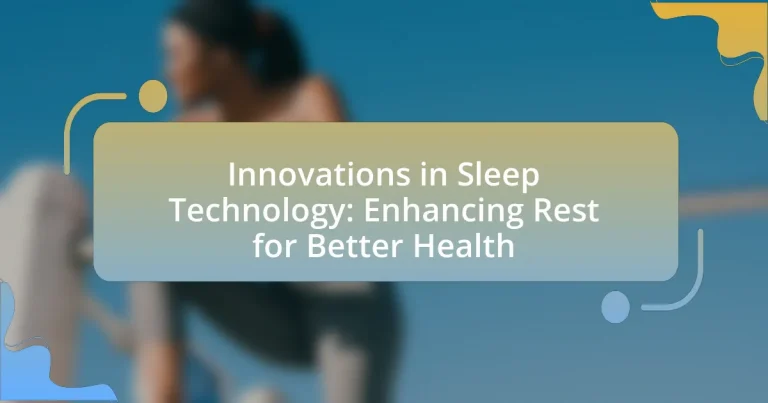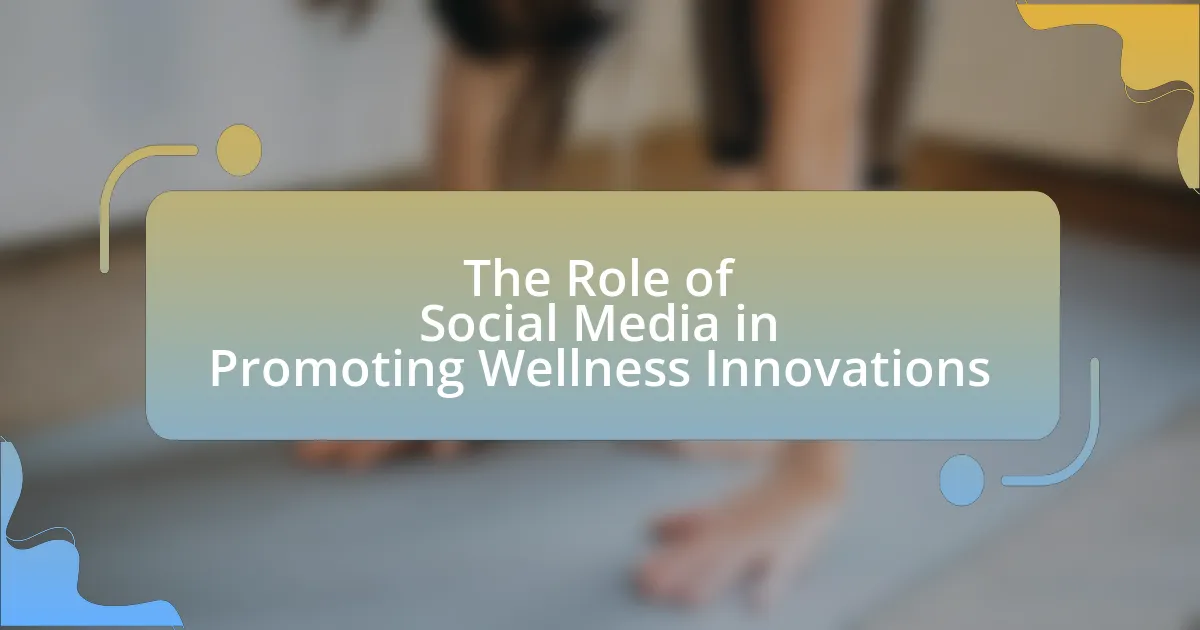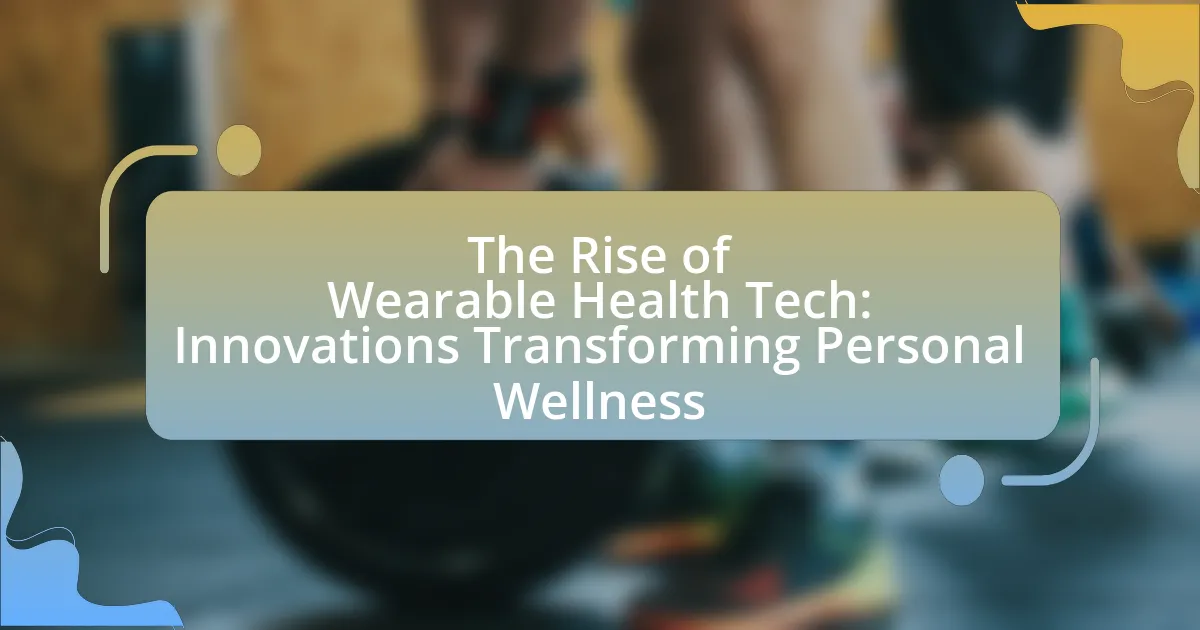The article focuses on the latest innovations in sleep technology, highlighting advancements such as smart mattresses, sleep tracking devices, and advanced sleep aids. It discusses how these technologies improve sleep quality by offering personalized insights, optimizing sleep environments, and addressing common sleep disorders. Additionally, the article outlines the health benefits associated with improved sleep, including enhanced cognitive function and emotional regulation. It also provides guidance on selecting appropriate sleep technology based on individual needs and budget considerations, while emphasizing best practices for integrating these technologies into daily life to maximize their benefits.
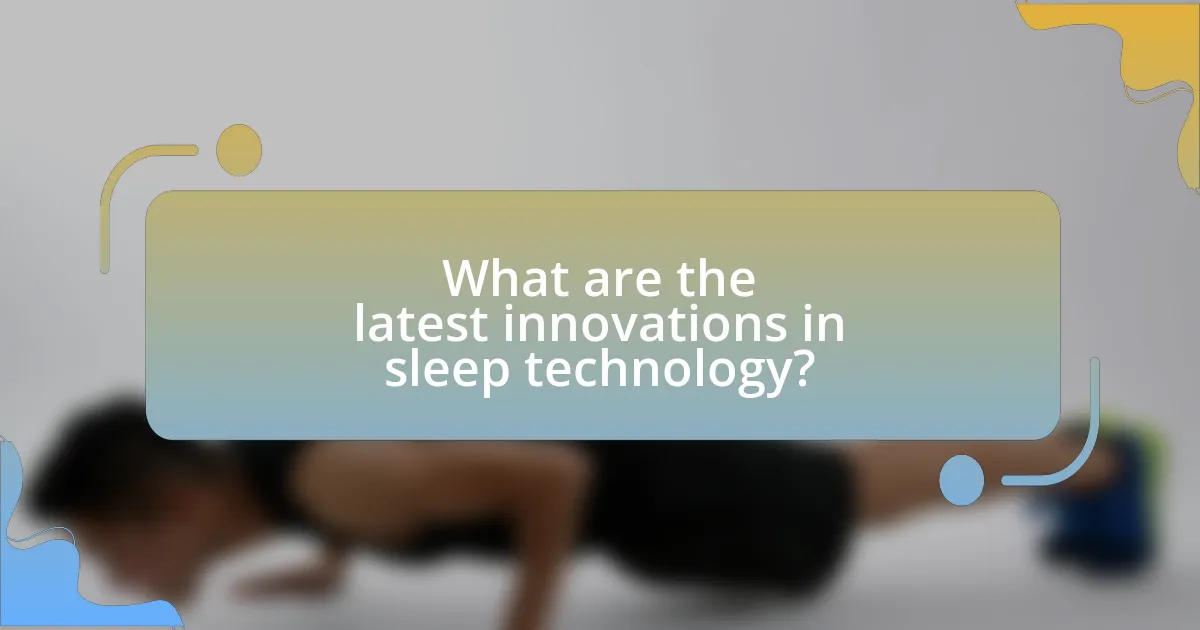
What are the latest innovations in sleep technology?
The latest innovations in sleep technology include smart mattresses, sleep tracking devices, and advanced sleep aids. Smart mattresses, such as those from companies like Sleep Number, adjust firmness and temperature based on individual preferences and sleep patterns, enhancing comfort and support. Sleep tracking devices, like the Oura Ring, monitor various metrics such as heart rate, body temperature, and sleep stages, providing users with insights to improve their sleep quality. Additionally, advanced sleep aids, including white noise machines and sleep apps that utilize cognitive behavioral therapy techniques, help users manage insomnia and improve overall sleep hygiene. These innovations are supported by research indicating that personalized sleep solutions can significantly enhance sleep quality and overall health.
How do these innovations improve sleep quality?
Innovations in sleep technology improve sleep quality by utilizing advanced features such as personalized sleep tracking, smart alarms, and environmental adjustments. Personalized sleep tracking devices monitor sleep patterns and provide insights that help users optimize their sleep schedules, leading to more restorative sleep. Smart alarms wake users during the lightest sleep phase, reducing grogginess and enhancing alertness upon waking. Additionally, technologies that adjust room temperature, humidity, and light levels create an ideal sleep environment, which has been shown to significantly enhance sleep quality. Studies indicate that individuals using these innovations report improved sleep duration and satisfaction, demonstrating their effectiveness in promoting better health through enhanced rest.
What specific technologies are being developed for better sleep?
Specific technologies being developed for better sleep include smart mattresses, sleep tracking devices, and sleep-enhancing apps. Smart mattresses utilize sensors to monitor sleep patterns and adjust firmness or temperature for optimal comfort. Sleep tracking devices, such as wearables, collect data on sleep quality and duration, providing insights for improvement. Sleep-enhancing apps offer guided meditations, soundscapes, and personalized sleep plans to help users achieve better rest. These innovations are supported by research indicating that personalized sleep solutions can significantly improve sleep quality and overall health.
How do these technologies address common sleep disorders?
Technologies such as sleep tracking devices, smart mattresses, and cognitive behavioral therapy apps effectively address common sleep disorders by providing personalized insights and interventions. Sleep tracking devices monitor sleep patterns and provide data that can help users identify issues like insomnia or sleep apnea, enabling targeted lifestyle changes. Smart mattresses adjust firmness and temperature based on user preferences, promoting better sleep quality. Cognitive behavioral therapy apps offer structured programs to help users manage anxiety and stress, which are often underlying causes of sleep disorders. Research indicates that these technologies can lead to improved sleep outcomes, with studies showing that users experience a significant reduction in sleep disturbances and increased overall sleep satisfaction.
Why is sleep technology important for health?
Sleep technology is important for health because it enhances sleep quality and duration, which are critical for overall well-being. Research indicates that poor sleep is linked to various health issues, including obesity, diabetes, cardiovascular diseases, and mental health disorders. For instance, a study published in the journal “Sleep” found that individuals using sleep tracking devices improved their sleep patterns, leading to better health outcomes. By providing insights into sleep habits and facilitating better sleep environments, sleep technology plays a vital role in promoting healthier lifestyles and preventing chronic health conditions.
What are the health benefits associated with improved sleep?
Improved sleep offers numerous health benefits, including enhanced cognitive function, better emotional regulation, and a strengthened immune system. Research indicates that adequate sleep is crucial for memory consolidation, problem-solving skills, and overall mental clarity, as demonstrated in a study published in the journal “Sleep” by Walker and Stickgold, which highlights the role of sleep in memory processing. Additionally, improved sleep quality is linked to lower levels of stress and anxiety, as well as a reduced risk of chronic conditions such as obesity, diabetes, and cardiovascular diseases, according to findings from the National Sleep Foundation. These benefits underscore the importance of prioritizing sleep for overall health and well-being.
How does sleep technology contribute to mental well-being?
Sleep technology contributes to mental well-being by improving sleep quality and duration, which are crucial for cognitive function and emotional regulation. Devices such as sleep trackers and smart mattresses provide insights into sleep patterns, enabling users to make informed adjustments to their sleep environment and habits. Research indicates that better sleep quality is linked to reduced symptoms of anxiety and depression, as well as enhanced mood and overall mental health. For instance, a study published in the journal “Sleep Health” found that individuals who utilized sleep technology reported significant improvements in sleep quality and a corresponding decrease in mental health issues.
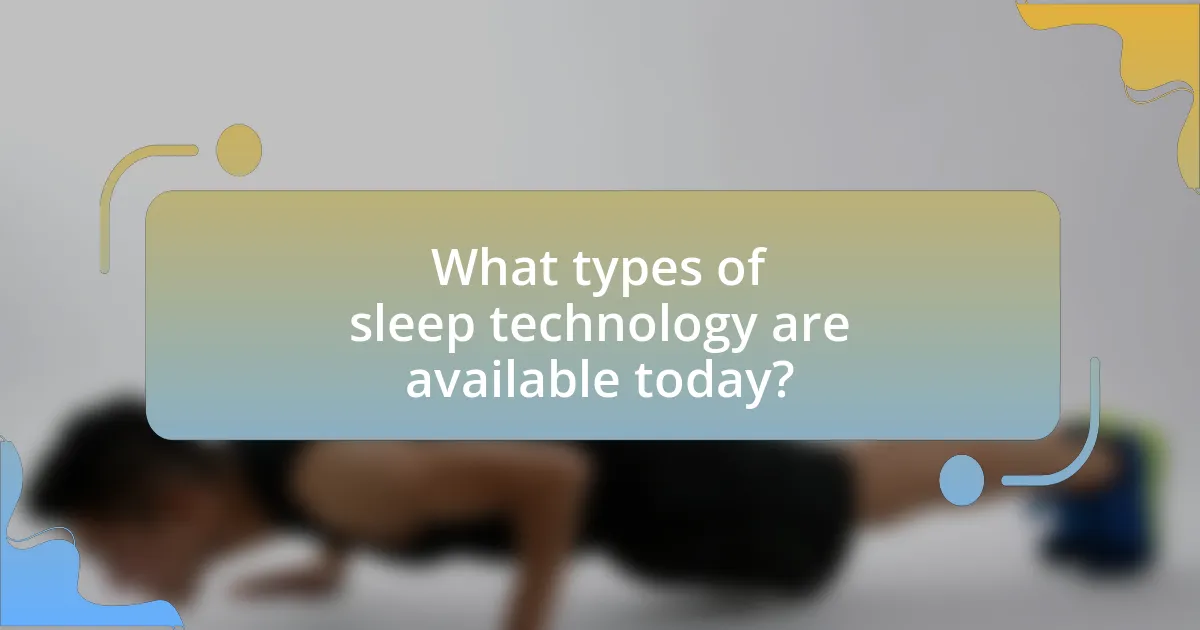
What types of sleep technology are available today?
Various types of sleep technology are available today, including sleep tracking devices, smart mattresses, white noise machines, and sleep apps. Sleep tracking devices, such as fitness bands and smartwatches, monitor sleep patterns and provide insights into sleep quality. Smart mattresses adjust firmness and temperature based on user preferences and sleep positions, enhancing comfort. White noise machines create soothing sounds to mask disruptive noises, promoting better sleep environments. Sleep apps offer guided meditations, relaxation techniques, and sleep hygiene tips, helping users improve their sleep habits. These technologies are designed to enhance sleep quality and overall health, supported by research indicating that better sleep contributes to improved physical and mental well-being.
How do wearable sleep trackers function?
Wearable sleep trackers function by utilizing sensors to monitor various physiological parameters during sleep. These devices typically measure heart rate, movement, and sometimes even blood oxygen levels to assess sleep quality and patterns. For instance, accelerometers detect movement to differentiate between sleep stages, while heart rate variability can indicate sleep depth. Research has shown that these metrics can provide insights into sleep duration and disturbances, helping users understand their sleep health better.
What metrics do these devices measure?
Sleep technology devices measure several key metrics, including sleep duration, sleep quality, sleep stages (such as REM and deep sleep), heart rate, and respiratory rate. These metrics provide insights into an individual’s sleep patterns and overall health. For instance, studies have shown that tracking sleep stages can help identify sleep disorders, while monitoring heart rate variability can indicate stress levels and recovery status.
How accurate are wearable sleep trackers in monitoring sleep?
Wearable sleep trackers are generally accurate in monitoring sleep, with studies indicating an accuracy range of 70% to 90% when compared to polysomnography, the gold standard for sleep measurement. Research published in the Journal of Clinical Sleep Medicine found that devices like Fitbit and Apple Watch can effectively track sleep duration and stages, although they may struggle with differentiating between light and deep sleep. Additionally, a meta-analysis in Sleep Health highlighted that while wearable trackers provide valuable insights into sleep patterns, their accuracy can vary based on the specific device and individual user factors.
What role do smart mattresses play in sleep technology?
Smart mattresses play a crucial role in sleep technology by integrating advanced sensors and connectivity features to monitor and enhance sleep quality. These mattresses collect data on sleep patterns, heart rate, and body temperature, allowing users to receive personalized insights and recommendations for improving their sleep environment. For instance, a study published in the Journal of Clinical Sleep Medicine found that sleep tracking technology can lead to better sleep hygiene and overall health outcomes. By adjusting firmness, temperature, and support based on real-time data, smart mattresses contribute significantly to optimizing sleep quality and promoting better health.
How do smart mattresses adjust to individual sleep patterns?
Smart mattresses adjust to individual sleep patterns by utilizing sensors and algorithms to monitor and analyze sleep data in real-time. These mattresses track metrics such as heart rate, body movements, and sleep stages, allowing them to customize firmness, temperature, and support levels based on the user’s specific needs. For instance, studies have shown that smart mattresses can improve sleep quality by up to 30% by adapting to the sleeper’s position and preferences throughout the night. This dynamic adjustment helps enhance comfort and promotes better overall health by ensuring optimal sleep conditions tailored to each individual.
What features do smart mattresses offer for enhancing sleep?
Smart mattresses offer features such as adjustable firmness, temperature regulation, sleep tracking, and smart alarms to enhance sleep quality. Adjustable firmness allows users to customize the mattress’s support level, catering to individual comfort preferences. Temperature regulation features, often utilizing cooling gels or adjustable heating, help maintain an optimal sleep environment, which studies show can improve sleep quality. Sleep tracking technology monitors sleep patterns and provides insights, enabling users to make informed adjustments to their sleep habits. Smart alarms wake users during light sleep phases, reducing grogginess and improving overall restfulness. These features collectively contribute to a more restorative sleep experience, supported by research indicating that personalized sleep environments can significantly enhance sleep quality and health outcomes.
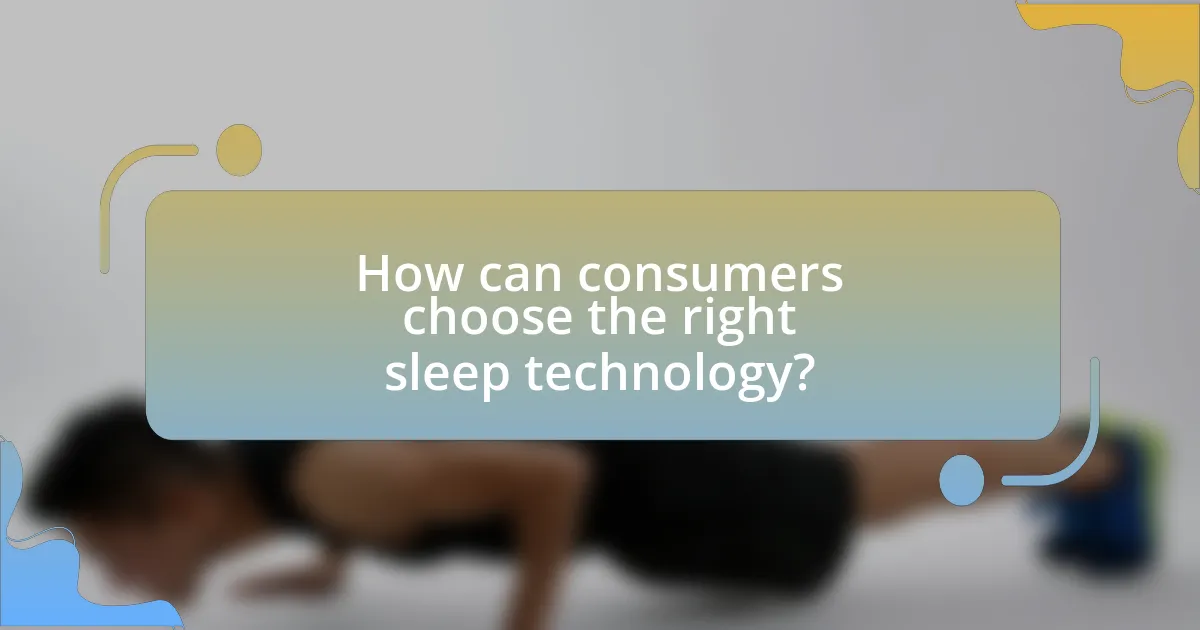
How can consumers choose the right sleep technology?
Consumers can choose the right sleep technology by assessing their specific sleep needs and preferences. Identifying factors such as sleep disorders, comfort preferences, and desired features—like temperature control or sleep tracking—can guide consumers in selecting suitable products. Research indicates that personalized sleep solutions, such as adjustable mattresses or smart sleep devices, can significantly improve sleep quality. For instance, a study published in the Journal of Clinical Sleep Medicine found that individuals using sleep tracking technology reported better sleep outcomes compared to those who did not. Therefore, understanding personal requirements and leveraging evidence-based products can help consumers make informed decisions in selecting effective sleep technology.
What factors should be considered when selecting sleep technology?
When selecting sleep technology, factors such as functionality, user comfort, data accuracy, integration with other devices, and cost should be considered. Functionality refers to the specific features offered, such as sleep tracking, noise reduction, or light adjustment, which can enhance sleep quality. User comfort is crucial, as technology should not disrupt sleep but rather promote relaxation. Data accuracy is important for reliable insights into sleep patterns, with studies indicating that accurate tracking can lead to better sleep management. Integration with other devices, like smart home systems, can enhance usability and effectiveness. Lastly, cost should align with budget constraints while ensuring that the selected technology meets the desired needs and quality standards.
How do personal sleep needs influence technology choice?
Personal sleep needs significantly influence technology choice by determining the specific features and functionalities individuals prioritize in sleep-related devices. For instance, someone who requires a cooler sleeping environment may opt for smart mattresses with temperature control, while an individual with sleep apnea might choose CPAP machines equipped with advanced monitoring capabilities. Research indicates that 70 million Americans suffer from sleep disorders, highlighting the demand for tailored sleep technology that addresses unique needs. Consequently, the growing market for sleep technology reflects a direct correlation between personal sleep requirements and the selection of devices designed to enhance sleep quality and overall health.
What budget considerations should consumers keep in mind?
Consumers should keep in mind the total cost of sleep technology products, including initial purchase price, ongoing maintenance, and potential replacement costs. For instance, high-quality mattresses and sleep trackers can range from several hundred to several thousand dollars, and consumers should also consider the longevity of these products, as a mattress typically lasts about 7-10 years. Additionally, consumers should factor in any subscription fees for sleep apps or services that may accompany certain technologies, which can add to the overall expense. Understanding these budget considerations helps consumers make informed decisions that align with their financial capabilities while investing in their sleep health.
What are some best practices for integrating sleep technology into daily life?
To effectively integrate sleep technology into daily life, individuals should establish a consistent sleep schedule, utilize sleep tracking devices, and create a sleep-friendly environment. Consistent sleep schedules help regulate the body’s internal clock, improving sleep quality. Sleep tracking devices, such as smartwatches or apps, provide insights into sleep patterns, allowing users to make informed adjustments to their routines. Additionally, optimizing the sleep environment by controlling factors like light, noise, and temperature can enhance the effectiveness of sleep technology. Research indicates that a conducive sleep environment significantly contributes to better sleep quality and overall health.
How can users maximize the benefits of sleep technology?
Users can maximize the benefits of sleep technology by consistently utilizing sleep tracking devices and apps to monitor their sleep patterns. These technologies provide insights into sleep quality, duration, and disturbances, allowing users to make informed adjustments to their sleep environment and habits. For instance, studies show that individuals who track their sleep are more likely to identify factors affecting their rest, such as room temperature or caffeine intake, leading to improved sleep hygiene. Additionally, integrating features like smart alarms that wake users during lighter sleep stages can enhance overall sleep quality, as research indicates that waking during light sleep reduces grogginess and improves alertness.
What common mistakes should be avoided when using sleep technology?
Common mistakes to avoid when using sleep technology include relying solely on devices without addressing underlying sleep issues, neglecting to customize settings for individual needs, and ignoring the importance of sleep hygiene. Relying on technology alone can lead to overlooking factors such as stress, diet, and environment that significantly impact sleep quality. Customizing settings, such as brightness and sound levels, is crucial because one-size-fits-all solutions may not suit everyone. Additionally, maintaining good sleep hygiene practices, like consistent sleep schedules and a conducive sleep environment, is essential for maximizing the benefits of sleep technology.
